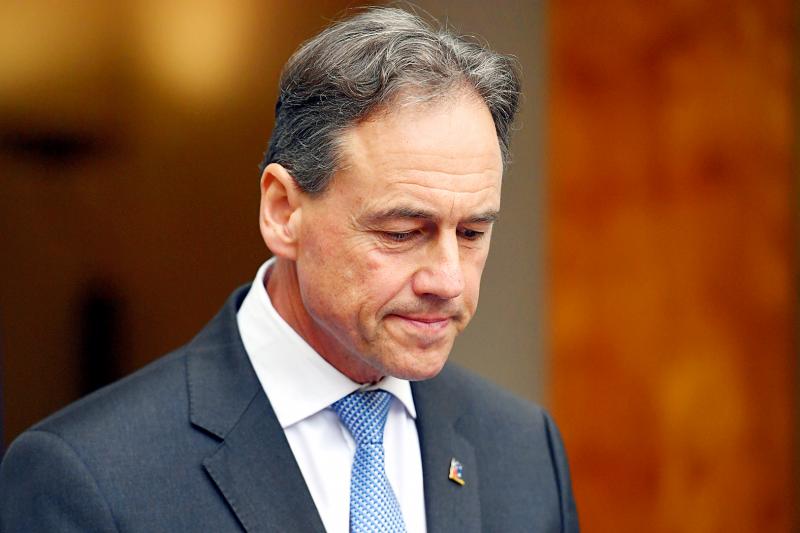Australia’s premiers have demanded that the federal government slow the pace of arrivals from overseas, and have queried a decision to allow people under the age of 40 to have AstraZeneca jabs, as the emergence of the highly infectious Delta variant of SARS-CoV-2 triggered lockdowns in Sydney, parts of Queensland, Perth and the Northern Territory.
After flagging a review of Australia’s stretched hotel quarantine system during Monday night’s national Cabinet meeting, Victoria Premier Daniel Andrews and Queensland Premier Annastacia Palaszczuk yesterday publicly urged Australian Prime Minister Scott Morrison’s government to lower the cap on international arrivals for the next three months.
The premiers said restrictions on arrivals would likely prevent further lockdowns while the national COVID-19 vaccination rollout gathers pace.

Photo: EPA-EFE
Palaszczuk and Victoria Minister for Health Martin Foley also queried the signal from Morrison on Monday night after an emergency national Cabinet meeting that people under 40 could now have access to AstraZeneca jabs through general practitioners (GPs) indemnified by the commonwealth.
Palaszczuk — who raised concerns about giving AstraZeneca to people under 60 during a national Cabinet discussion in April — told reporters yesterday that governments should follow advice from the Australian Technical Advisory Group on Immunisation (ATAGI).
“The clinical advice from ATAGI is that people under the age of 60 should preferentially get Pfizer,” Queensland Chief Health Officer Jeannette Young said.
Foley said eligibility for AstraZeneca jabs to people under 40 “was not a decision of national Cabinet.”
“If it means more people can get access to more vaccines that’s a good thing, but what we need to do is just clarify precisely what it is that the prime minister has announced and make sure that we put it into operation as quickly and as seamlessly as we can both in our GP clinics and our state vaccination clinics,” Foley said.
Western Australia Premier Mark McGowan told reporters that Monday night’s shift was not a national Cabinet decision, it was a decision of the government.
“The commonwealth makes these decisions, and we were advised” on Monday night, McGowan said.
With the number of COVID-19 infections rising in several states, the Queensland government yesterday imposed a snap lockdown covering southeast Queensland, Townsville, Palm Island and Magnetic Island.
Sydney remains locked down, while Darwin and the surrounding areas have been put into lockdown until 1pm on Friday. In Western Australia, the Perth and Peel regions are also in lockdown.
“We have a large proportion of our state unvaccinated. The federal government is in charge of supply of that vaccination, and we know that it’s all coming in the last quarter” of this year, Palaszczuk said.
“Until that time, there is a real risk, and until that time that the large proportion of the Queensland public are vaccinated, we should massively reduce the number of returning Australians,” she said.
Australian Minister of Health Greg Hunt said that “we have arguably the strongest, or one of the strongest systems in the world.”
Australia had an obligation to “bring people home, as so many want to do, and rightly so,” he said.

ELECTION DISTRACTION? When attention shifted away from the fight against the militants to politics, losses and setbacks in the battlefield increased, an analyst said Recent clashes in Somalia’s semi-autonomous Jubaland region are alarming experts, exposing cracks in the country’s federal system and creating an opening for militant group al-Shabaab to gain ground. Following years of conflict, Somalia is a loose federation of five semi-autonomous member states — Puntland, Jubaland, Galmudug, Hirshabelle and South West — that maintain often fractious relations with the central government in the capital, Mogadishu. However, ahead of elections next year, Somalia has sought to assert control over its member states, which security analysts said has created gaps for al-Shabaab infiltration. Last week, two Somalian soldiers were killed in clashes between pro-government forces and

Ten cheetah cubs held in captivity since birth and destined for international wildlife trade markets have been rescued in Somaliland, a breakaway region of Somalia. They were all in stable condition despite all of them having been undernourished and limping due to being tied in captivity for months, said Laurie Marker, founder of the Cheetah Conservation Fund, which is caring for the cubs. One eight-month-old cub was unable to walk after been tied up for six months, while a five-month-old was “very malnourished [a bag of bones], with sores all over her body and full of botfly maggots which are under the

BRUSHED OFF: An ambassador to Australia previously said that Beijing does not see a reason to apologize for its naval exercises and military maneuvers in international areas China set off alarm bells in New Zealand when it dispatched powerful warships on unprecedented missions in the South Pacific without explanation, military documents showed. Beijing has spent years expanding its reach in the southern Pacific Ocean, courting island nations with new hospitals, freshly paved roads and generous offers of climate aid. However, these diplomatic efforts have increasingly been accompanied by more overt displays of military power. Three Chinese warships sailed the Tasman Sea between Australia and New Zealand in February, the first time such a task group had been sighted in those waters. “We have never seen vessels with this capability

‘NO INTEGRITY’: The chief judge expressed concern over how the sentence would be perceived given that military detention is believed to be easier than civilian prison A military court yesterday sentenced a New Zealand soldier to two years’ detention for attempting to spy for a foreign power. The soldier, whose name has been suppressed, admitted to attempted espionage, accessing a computer system for a dishonest purpose and knowingly possessing an objectionable publication. He was ordered into military detention at Burnham Military Camp near Christchurch and would be dismissed from the New Zealand Defence Force at the end of his sentence. His admission and its acceptance by the court marked the first spying conviction in New Zealand’s history. The soldier would be paid at half his previous rate until his dismissal